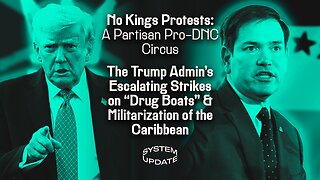Premium Only Content

About the prosecuted Berbers in Morocco.
Despite the weakness of its authority, the 'Alawi dynasty distinguished itself in the eighteenth and nineteenth centuries by maintaining Morocco’s independence while other states in the region succumbed to French or British domination. However, in the second part of the nineteenth century, Morocco’s weakness and instability invited European intervention to protect threatened investments and to demand economic concessions. Following the Hispano-Moroccan War of 1859–1860, Spain obtained the recognition by Morocco of its perpetual sovereignty over Ceuta, Melilla and the Chafarinas Islands as well as of the territory of Ifni. The first years of the twentieth century witnessed a rush of diplomatic maneuvering through which the European powers, France in particular, furthered their interests in North Africa.[13]
French activity in Morocco began at the end of the nineteenth century. In 1904, the French government was trying to establish a protectorate over Morocco and had managed to sign two bilateral secret agreements with Britain (8 April 1904, see Entente cordiale) and Spain (7 October 1904), which guaranteed the support of the powers in question in this endeavor. That same year, France sponsored the creation of the Moroccan Debt Administration in Tangier. France and Spain secretly partitioned the territory of the sultanate, with Spain receiving concessions in the far north and south of the country.[14]
First Moroccan Crisis: March 1905 – May 1906
Main articles: First Moroccan Crisis and Algeciras Conference
The First Moroccan Crisis took place owing to the imperial rivalries of the great powers, in this case, between Germany on one side and France, with British support, on the other. Germany took immediate diplomatic action to block the new accord from going into effect, including the dramatic visit of Wilhelm II to Tangier on 31 March 1905. Kaiser Wilhelm tried to get Morocco's support if they went to war with France or Britain, and gave a speech expressing support for Moroccan independence, which amounted to a provocative challenge to French influence in Morocco.[15]
In 1906, the Algeciras Conference was held to settle the dispute. Germany accepted an agreement in which France agreed to yield control of the Moroccan police, but otherwise retained effective control of Moroccan political and financial affairs. Although the Algeciras Conference temporarily solved the First Moroccan Crisis it only worsened international tensions between the Triple Alliance and the Triple Entente.[16]
French invasion
-
 2:03:29
2:03:29
Inverted World Live
8 hours agoNASA Says Earth Has Two Moons, 3I/Atlas Hiding Behind The Sun | Ep. 126
138K16 -
 3:10:08
3:10:08
TimcastIRL
8 hours agoNO KINGS Protester Yells KILL DHS, Liberal Tries KILLING Trump Supporter At His Home | Timcast IRL
244K108 -
 1:00:31
1:00:31
FreshandFit
10 hours agoWe Are In A Recession...Do This Now!
55.1K24 -
 LIVE
LIVE
Side Scrollers Podcast
1 day ago🔴SIDE SCROLLERS FUND-A-THON🔴DAY 1🔴100% REVENUE HELPS CHANGE CULTURE!
1,190 watching -
 3:03:39
3:03:39
Barry Cunningham
9 hours agoPRESIDENT TRUMP HAS A MAJOR WIN AND HIS TEAM IS ABSOLUTELY UNLEASHED!
70.2K37 -
 58:59
58:59
Flyover Conservatives
1 day agoThe Agenda Behind No Kings — They Lied. They Funded It.; Silver Explosion FAR from Over, PhD Explains What’s Next and Why! - Dr. Kirk Elliott | FOC Show
47K8 -
 1:55:03
1:55:03
We Like Shooting
19 hours ago $12.08 earnedWe Like Shooting 633 (Gun Podcast)
37.3K -
 1:32:29
1:32:29
Glenn Greenwald
11 hours agoNo Kings Protests: A Partisan Pro-DNC Circus; The Trump Admin's Escalating Strikes on "Drug Boats" and Militarization of the Caribbean | SYSTEM UPDATE #534
132K89 -
 3:49:31
3:49:31
SOLTEKGG
8 hours ago🔴LIVE - BATTLEFIELD 6 W/ SOLTEK
48.4K -
 3:46:40
3:46:40
VapinGamers
7 hours ago $3.90 earnedBattlefield 6 - Gettin My Body Ready for BR and Other Funzies with Friends - !rumbot !music
39K